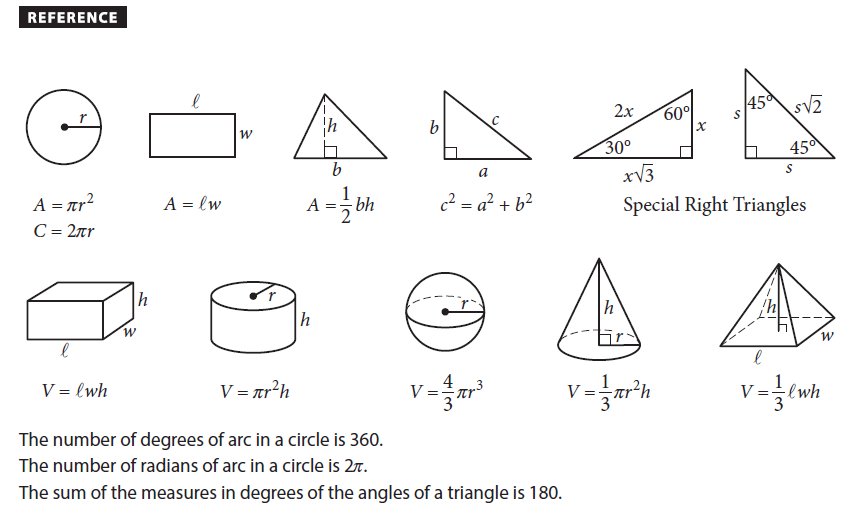 You have less than two weeks to prepare. First of all, as I always advise, you should take an entire sample ACT under timed conditions, including the essay question. You really need to know what kinds of problems take too long for you to solve and see if you can find a shortcut for that problem in your ACT or SAT review books. Chapter 5 in Barron’s New SAT would be useful here – yes, it’s an SAT guide, but most of the advice also applies to the ACT. Essay Prep: Speaking of the essay, some topics that might come up would be things that have been “hot potatoes” in the news for the last year or so. With Trump’s election, several topics have come up in the news repeatedly:
Math Test Prep: Among other things, you should know the basic math formulas listed in the SAT “Math Facts” box found at the beginning of every SAT math section (see below). Unlike the SAT, the ACT will usually give you the harder formulas (but you should make sure you’ve memorized the quadratic formula for quadratic equations you can’t solve by factoring or completing the square). It's in my earlier blog entries, and you can also just Google it if you don't know what it is). You should also know that if a multiple choice question has radicals in it (for example, the square root of 3), that's a dead giveaway that the equation has to be solved with the quadratic formula. English Test Prep: As far as the English test is concerned, make sure you know the proper use of commas, dashes, semicolons, and colons. Make sure you know how to join independent clauses (i.e. complete sentences) into one sentence using a semicolon or a comma followed by a FANBOYS (For, And, Nor, But, Or, Yet, So) conjunction. Know you can’t join two independent clauses with just a comma – that’s a “comma splice.” Know the present and past participles of irregular verbs – the forms that include “have” or “had” – e.g., “By the time we arrive, the play had already begun.” See my earlier blog entries on the SAT and ACT for more advice on the English section. Reading and Science Test Prep: The main thing about the reading and science ACT tests are that they’re speed tests. The best way I find to approach them is to read the questions, then look back in the passage for the answers – scan for words relating to the question, then check to make sure the words haven’t been used to trick you. For example, if a passage reads “The US Civil War was NOT primarily fought over slavery,” make sure you don’t choose an answer that says “The author states the primary reason the Civil War was fought was slavery.” Similarly, the science tests are generally best done by looking at the questions, then finding the data in the charts or the passage. If you understand the science underlying the passage, you may not even have to read the passage or the charts to pick the right answer! The worst-case scenario is that you end up having to read the whole passage anyway, which is likely if you’re reading prose fiction, since fiction is not necessarily organized in chronological (or even logical) order. Fiction writers are looking to entertain and tell a story, not relay information quickly and concisely – for example, novels and newspaper articles are written using very different styles. But scanning the passage for the information relevant to the passage should be the first method you try, and if that fails, just read the whole thing, marking off the places where you find important information. There is some chance that an answer to a science question will similarly be “buried” in the passage – you should look for an answer there if the charts and graphs don’t seem to have a clear answer to the question. My earlier blog entries have further advice on the ACT science and reading tests; my advice (which is based on my own experience and what others have written) on the SAT reading test in earlier blog entries will also help. Your experience may be different – I’d suggest you try my method, and then also try reading the passages first and doing the questions to see what works for you, but most likely you’ll find reading the questions first works best for the science section and most reading passages. Your comment will be posted after it is approved.
Leave a Reply. |
Author: John Linneball Who did you think? ;-)I'm the proprietor and only tutor for this business; that's why I named it after me. Archives
December 2023
Categories |
 RSS Feed
RSS Feed